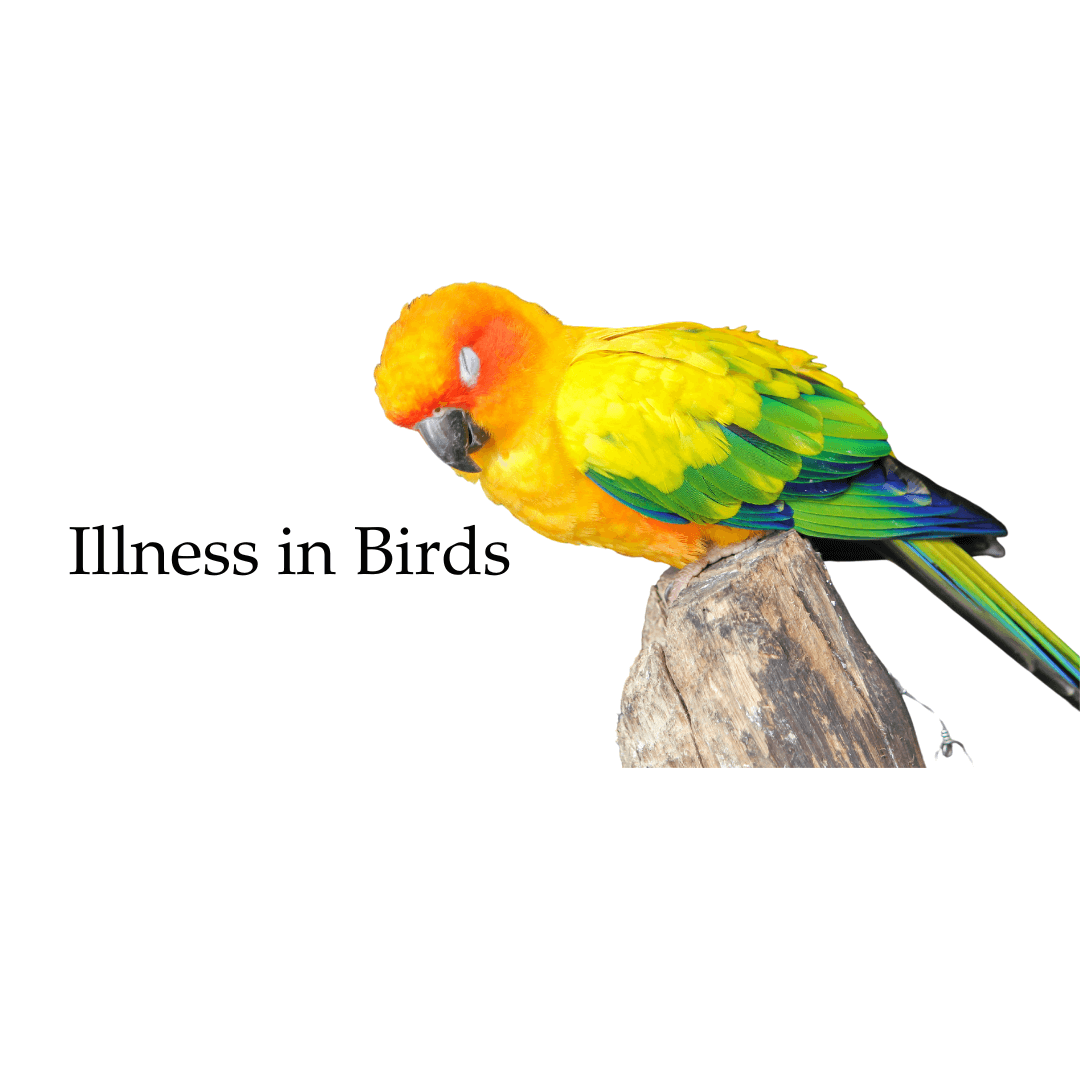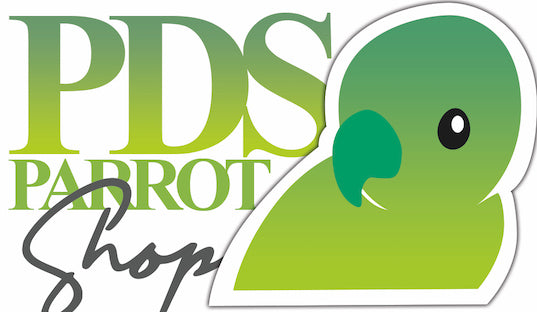
Illness in Birds and Their Symptoms
Share
Birds are masters at hiding their discomfort, a trait developed in the wild to protect themselves from predators. Unfortunately, this survival instinct makes it harder for bird owners to recognize when their feathered friends are unwell. Learning how to spot the signs of illness in birds early can save lives. The sooner you detect bird sickness symptoms, the faster you can get help and improve the chances of a full recovery.
Why Do Birds Hide Illness?
In the wild, a sick or injured bird is an easy target. Predators instinctively go after the weakest animal in a flock. This is why even ill birds will try to act normal until they are too sick to compensate. By the time a bird shows obvious signs of illness, it may already be very sick. This is why bird owners must know the early signs of trouble.

Common Bird Sickness Symptoms
Here are the most frequent signs that your bird might be sick:
1. Fluffed-Up Feathers
A bird will often puff up its feathers to keep warm, but if it stays fluffed up for hours and appears inactive, this is usually a sign of sickness. Ill birds may look puffed up while sitting still, even in a warm room.
2. Lethargy and Weakness
Healthy birds are curious and active. If your bird is unusually quiet, staying in one spot for long periods, or seems tired all day, it could be sick. Lethargy is one of the most common symptoms of illness in birds.
3. Changes in Droppings
One of the clearest bird sickness symptoms is a change in droppings. Watch for:
-
Watery droppings
-
Bright green or yellow urates
-
Undigested food in the feces
-
A strong or unusual odor
Changes could indicate infections, liver disease, parasites, or digestive issues.
4. Loss of Appetite or Weight Loss
If your bird stops eating, is picking at food without actually eating it, or loses weight quickly, it may be ill. Rapid weight loss can be especially dangerous in small birds like finches, budgies, or cockatiels.
5. Discharge from the Eyes or Nose
Clear or colored discharge, crusty eyes, or a runny nose can indicate respiratory infections, allergies, or other medical concerns. Respiratory illness in birds should be treated urgently.
6. Tail Bobbing
Watch your bird’s tail when it breathes. A healthy bird may move slightly, but if the tail bobs noticeably with each breath, it may be struggling to breathe—a clear sign of respiratory distress.
7. Change in Vocalizations
A noisy bird that suddenly goes quiet or a quiet bird that starts making strange sounds may be sick. Loss of voice, wheezing, or clicking sounds can indicate illness.
8. Poor Feather Condition or Plucking
Feathers should be smooth, vibrant, and clean. Dull, broken, and/or greasy feathers can be a sign of nutritional deficiencies, stress, or illness. Birds that start over-preening or plucking may be in physical or emotional distress.
9. Swelling or Lumps
Any abnormal lump or swelling, especially around the abdomen, eyes, or feet, should be evaluated by a vet. It could be a sign of infection, a cyst, or even a tumor.
10. Balancing Problems or Tremors
Birds that are having trouble perching, are falling off their perch, or are trembling may have neurological issues, muscle weakness, or injury. These are serious symptoms and should not be ignored.
Behavioral Signs of Illness in Birds
Sometimes the signs of a sick bird are more behavioral than physical:
-
Sudden aggression or withdrawal
-
Sleeping more during the day
-
Ignoring toys or food
-
Sitting at the bottom of the cage
-
Unusual body posture (e.g., head tucked, drooping wings)
Even one of these signs might indicate illness, but a combination of them is a clear red flag.
What Should You Do If Your Bird Is Sick?
If you notice any bird sickness symptoms, take the following steps:
-
Call an Avian Veterinarian
Not all vets specialize in birds. Look for an avian vet who understands the unique biology and needs of birds. -
Keep the Bird Warm and Quiet
Sick birds benefit from a calm, warm environment. Cover part of the cage to reduce stress and place it in a warm (not hot) draft-free area. -
Monitor Closely
Record any changes in food and water intake, droppings, or behavior. This information helps the vet make a diagnosis. -
Avoid Self-Diagnosing
Never treat your bird without guidance. Medications meant for other animals—or even people—can harm birds.
Preventing Illness in Birds
Prevention is key when it comes to keeping your birds healthy. Follow these steps to help reduce the chances of illness:
-
Provide a balanced, species-appropriate diet with fresh fruits, vegetables, and quality pellets.
-
Clean food and water bowls daily.
-
Offer regular veterinary checkups, especially for older birds or those with chronic conditions.
-
Give your bird plenty of mental stimulation, toys, and social interaction.
-
Quarantine new birds for at least 30 days before introducing them to your flock.
Prevention Tips: Keeping Your Bird Healthy
Catching illness early is important, but preventing it is even better. Here are key ways to help your bird stay happy and healthy:
1. Schedule Regular Vet Checkups
Even if your bird looks fine, it’s important to visit an avian veterinarian at least once a year. Birds are experts at hiding sickness, and regular exams help catch hidden problems early. Your vet can check weight, droppings, breathing, and offer diet advice.
Bonus Tip: Keep a notebook of your bird’s weight, eating habits, and droppings so you can share any changes with your vet.
2. Clean Cages and Perches Daily
A clean cage is essential for good health. Wipe down surfaces, change the cage liner, and clean up leftover food or droppings every day. Weekly deep cleaning with bird-safe disinfectant will reduce the risk of bacteria, mold, or parasites.
What to clean:
-
Perches
-
Cage bars
-
Tray and grate
-
Toys, food, and water bowls
3. Wash Food and Water Bowls Daily
Dirty bowls can quickly become breeding grounds for bacteria and fungi. Always wash them with hot, soapy water daily. Rinse well, and never leave old food or dirty water in the cage.
Tip: Use stainless steel or ceramic bowls—they’re easier to clean and don’t hold bacteria like plastic can.
4) Invest in Safe Bird Toys
Not all bird toys are safe. Choose toys made from bird-safe materials such as untreated wood, vegetable-tanned leather, natural rope (like sisal or cotton), and stainless steel parts. Avoid toys with toxic dyes, sharp edges, or small parts that can break off.
Why it matters: Unsafe toys can cause injuries or expose your bird to toxins, leading to illness or emergency vet visits. High-quality, safe toys support mental and physical health.
5. Keep Toys Clean and Rotated
Toys get dirty with droppings and food and can grow bacteria or mold. Wash them regularly with warm water and mild soap. Rotate toys weekly to keep your bird engaged and prevent boredom, which can lead to stress or feather plucking.
Signs it’s time to clean or toss a toy:
-
Bad smell
-
Mold or frayed materials
-
Sticky or caked-on food
6. Provide a Healthy Diet
A good diet supports a strong immune system. Fresh vegetables, bird-safe fruits, grains, and a quality pellet should make up most of their meals. Avoid seed-only diets—they’re high in fat and low in nutrients.
7. Watch for Changes
Get to know your bird’s daily habits. Pay attention to:
-
Eating and drinking
-
Droppings
-
Weight
-
Energy level
-
Social behavior
Any change could be the first sign of illness in birds. Acting quickly can make all the difference.
Taking care of your bird’s environment, diet, and health needs every day helps prevent sickness and keeps your bird thriving. Clean living, regular checkups, and attentive care go a long way in keeping your feathered friend happy and safe.
Conclusion
Understanding the signs of illness in birds is vital for responsible bird care. Since birds instinctively hide sickness, any subtle changes can be important clues. By staying alert and learning to recognize bird sickness symptoms early, you can help ensure your bird gets the care it needs. If you ever suspect that your bird might be ill, don’t wait—contact an avian veterinarian right away. Your fast response could make all the difference.
More Articles about Bird Care
Petting Parrot: A Guide to Safe and Respectful Interaction
Parrot Care 101: The Complete Guide for a Healthy, Happy Bird
Monika Sangar, MSc – Molecular Biology | Avian Nutrition Specialist | Founder: PDSnonprofit | Owner: Pds Parrot Shop
Monika Sangar is a parrot rescuer, bird food chef, and toy designer with over a decade of experience in avian care and nutrition. She is the founder of Prego Dalliance Sanctuary and the author of The Science of Avian Nutrition, a cookbook dedicated to fresh, healthy meals for parrots. Explore more bird care tips and bird toys at PDS Parrot Shop!

